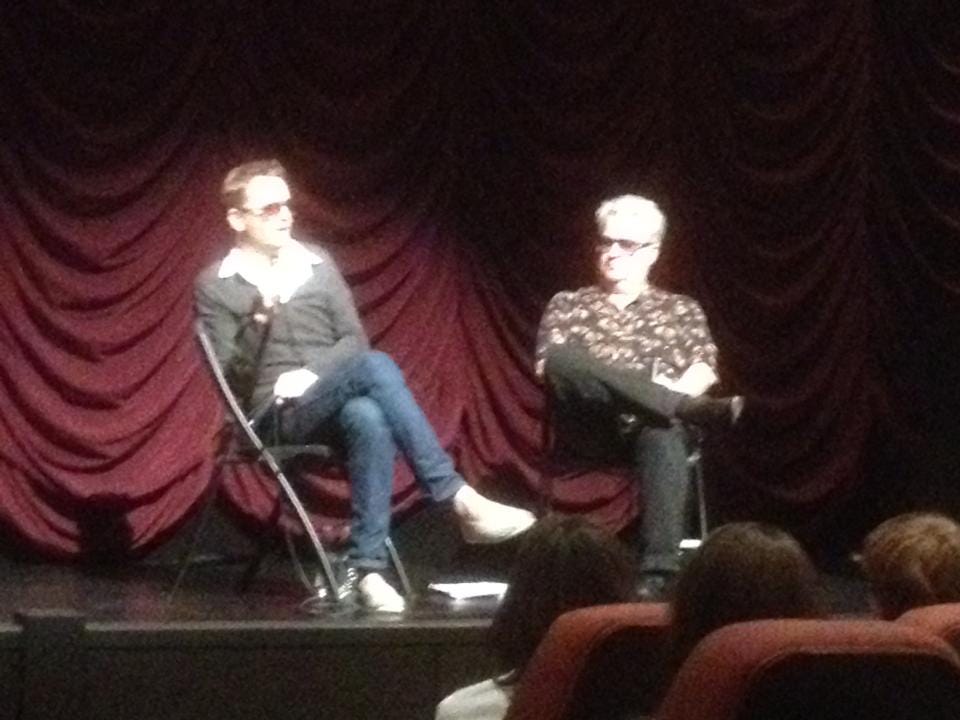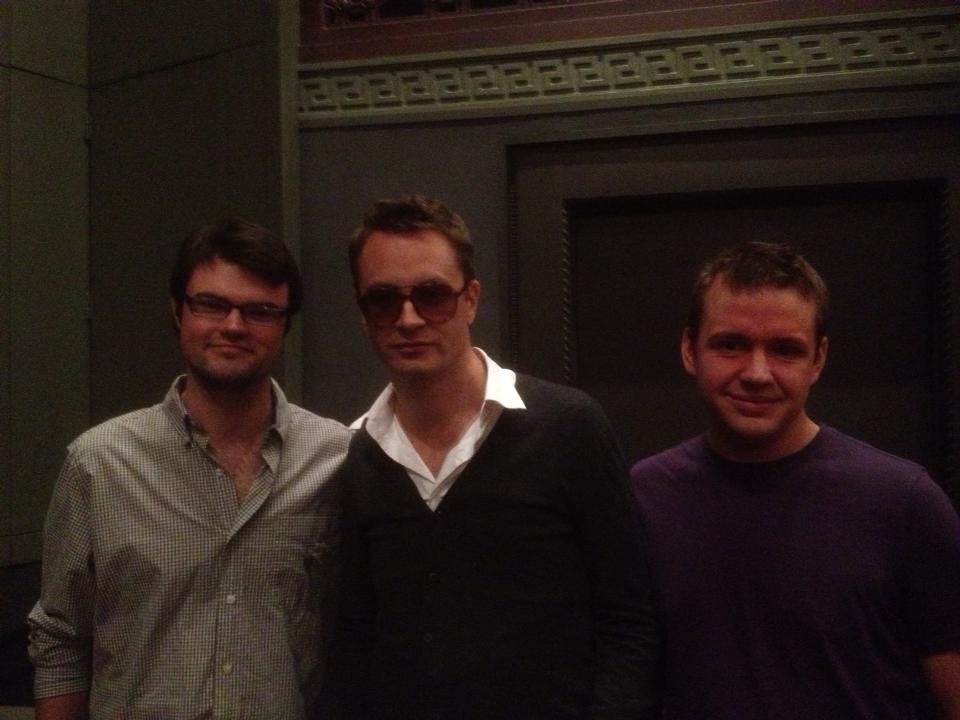Nicolas Winding Refn at Indiana University
This past weekend, Indiana University Cinema's Jorgensen Guest Filmmaker series hosted a lecture with filmmaker Nicolas Winding Refn. Since his 2005 film "Bronson," Refn's films have become known for expressive colors, lush soundtracks and graphic violence. Refn was on hand to screen his newest work, "Only God Forgives," at its Indiana premiere, as well as present a lecture on the work of infamous schlock director Andy Milligan.

Nicolas Winding Refn himself is a lanky Dane — fashionable, handsome, in some ways feminine, with an attitude you can't help but bask in. He carries himself like a man without worries. What worries could he have? After his modest success in Denmark with "Pusher" in 1996, his first attempt at an American film, "Fear X" (2000), bankrupted his production company and left him $1 million in debt. He's since climbed his way back into the limelight with "Bronson" (2005), "Valhalla Rising" (2009) and, most notably, "Drive" (2011). This year sees the release of his newest film, "Only God Forgives," a violent and moody crime drama set in the Thai underworld. Refn's career has seen him fall far, only to climb higher on his terms. So, why would he worry? As he vividly expressed multiple times throughout his lecture, his current goal is to make the films he wants to make, regardless of traditional modes of "success." He's an auteur — fascinating, well-spoken and oddly inspiring.
Art as an Act of Violence
The theme of IU's weekend of Refn was “Art as an Act of Violence,” a focus on the director's renowned use of graphic violence in an "artistic" fashion. Let me explain:
His films rarely follow the traditional action mold. Violence is present as a punishment ("Pusher"), as a personality ("Bronson") and as a force of nature ("Valhalla Rising," "Drive" and "Only God Forgives"). These films don't moralize the use of violence. Rather, violence is an act of consequence. To Refn, the absolute goal of art is to create a lasting feeling in an audience, to penetrate their minds. Violence is an act of violation. It creates a lasting effect.
In Refn's cinematic language, violence is an act of art.
On Andy Milligan:
Refn has recently dropped as much as $50,000 curating the films of Andy Milligan, a filmmaker whom he'd rank below Ed Wood in the lack-of-talent department. He has gone so far as to get some of Milligan's work restored and released by the British Film Institute. His ultimate goal is, maybe, the most expensive coffee table book ever written.
The panel started with a showing of the trailer for Milligan's “Nightbirds,” a 1970's sex-drama. It looked horrible. "Nightbirds" is NSFW, but here's the link.
While the trailer screened, we could hear Refn quietly laughing in the background, which prompts the question: Why save this man's work?
As Refn explained it, he feels in some way responsible for Milligan. Although Milligan was widely known as misogynistic and abusive to his actors, his films were made because he wanted to make them. They were expressions of himself, his own darkness. Refn empathizes with that drive, that need to create art regardless of reward. He would've wanted a benefactor to appreciate his films if he'd never found success.
His Inspirations:
Exploitation cinema was important to Refn's cinematic upbringing. Born to upper-class Scandinavian parents, Refn's main outlets of rebellion during the 1980s were trashy American cinema and Ronald Reagan. While he outgrew the latter, he still identifies greatly with that era of American film. "The Texas Chainsaw Massacre, in particular, is the foundation of his oeuvre.
He actively seeks projects outside his comfort zone. He has no interest in cars, vikings, or the real Charlie Bronson. He knew nothing of Thai culture before filming in Bangkok. His pitch for “Only God Forgives,” in fact, was, simply, “a fight movie in Bangkok, called 'Only God Forgives.” Why not?
In his words, 'art is weaknesses into strengths.'
His Method:
Fetish is central to his work and style. He arrives on set each day and decides what he wants to do. His first question: What turns me on? Does he want to see a naked woman? Ryan Gosling staring pensively at the screen awash in blue light? Tom Hardy on a stage in a suit? He doesn't need to know why he's turned on, but he follow his feelings wherever they take them.
He never storyboards. His only plot outline exists in the form of sticky notes on his office wall.
The audience asked several questions about the production of “Drive” and “Only God Forgives.” The two were filmed, unconventionally, in chronological order. Refn compared film making to sex. He wants to make films out of necessity. He doesn't want to know how it will end. Process, not result, is key. Once the process is over, he's lost interest in it. Time to move on.
Refn considers creativity on a Sex-Violence axis. People are driven by these two, always have been, and he wants to use it to connect to the audience. However, he has no 'agenda,' no views to express through film. Politics are not his thing. Penetration, in his words, is his artistic goal. Creating a work that sits in the mind of the audience for hours after the experience.
To Refn, No matter how much money a film makes, if it does not illicit feeling, it is a failure.
Masculinity and Femininity
“Only God Forgives” has a stand-out performance by Kristin Scott Thomas as a mob kingpin. Two audience members asked how Refn deals with issues of gender when making such violent films. In two parts, Refn gave his most interesting answers of the night.
The firs, regarding Kristin Scott Thomas' character: “I had a conventional fear of the female sexuality, which made it hard to incorporate them into my creative process..then I got a girlfriend, and, in a way, I had to eliminate male roles from my creative universe...and that's where this character came from.”
Later, he was asked how he views masculinity and violence. He answered that he views himself as a particularly feminine person. He deplores violence. He indulges in traditionally 'feminine' pursuits, in particular his vast collection of barbies. In a way, he sees violent masculinity as masculine only when viewed alongside feminine violence. The two co-exist, rather than one necessarily trumping the other.
Interesting thought, given the content of “Only God Forgives.”
Only God Forgives
The last portion of the Q&A focused on the making of “Only God Forgives.” Refn pitched the film to a French producer as part of a two-film deal, where he would make two movies for only 6 million a piece. He knew nothing but the setting and was largely ignorant about Thai culture. Characters, drama, and theme, came later.
Luke Evans was originally to star as Julian, who in the film is played by Ryan Gosling. Evans dropped out in favor of a role with "The Hobbit", weeks before production. While out on the town with Gosling celebrating “Drive,”, Refn vented to him about the role, and Gosling jumped at the chance. He later became a producer, and even suggested many of the film's more disturbing scenes.
The film had no sets built for its production. E
verything, aside from two or three strategically placed lights, exists in the film as they found it during location shooting. Many of the outdoor scenes were filmed on busy streets populated by passerby.
One audience member asked where Refn found Vithaya Pansiringarm, who plays Chang, the police captain out to get Julian's family. It turns out Vithaya was a local actor with few film credits. He was found after the production team sent out an open casting call across all of Bangkok. All of Pansirigarm's sword work and karaoke were done by the actor, and his work continues to impress Refn. Watch the film. It will impress you, too.
"Only God Forgives" was filmed on a shoestring budget. It was mostly conceived on the fly. That it turned out so excellent it a testament to Refn.
Wanna Fight?
In “Only God Forgives,” Ryan Gosling walks up to an enemy and asks, simply, “Wanna fight?” The scene, so striking in color and pace and handsomeness, has become central to the advertising of the film. It's become so well known that there was applause during the screening.
After the event, fellow Yapper Sam Watermeier and I approached Refn. He was...cool. So cool. Standing there by the stage in his sunglasses and well-pressed clothing, chatting with fans, taking pictures with them. We got our picture taken, and Sam pounced on the chance to ask Refn the question. The only question.
“Wanna Fight?”
Refn was confused for a second before laughing. “Ah, yeah, like from the film. Good one!”
For a man whose career has been defined by violence, he was awfully peaceful.

You can find my review for Only God Forgives here on Filmyap.
As well, Nicolas Winding Refn did an interview with my fellow yapper Joe Shearer.


